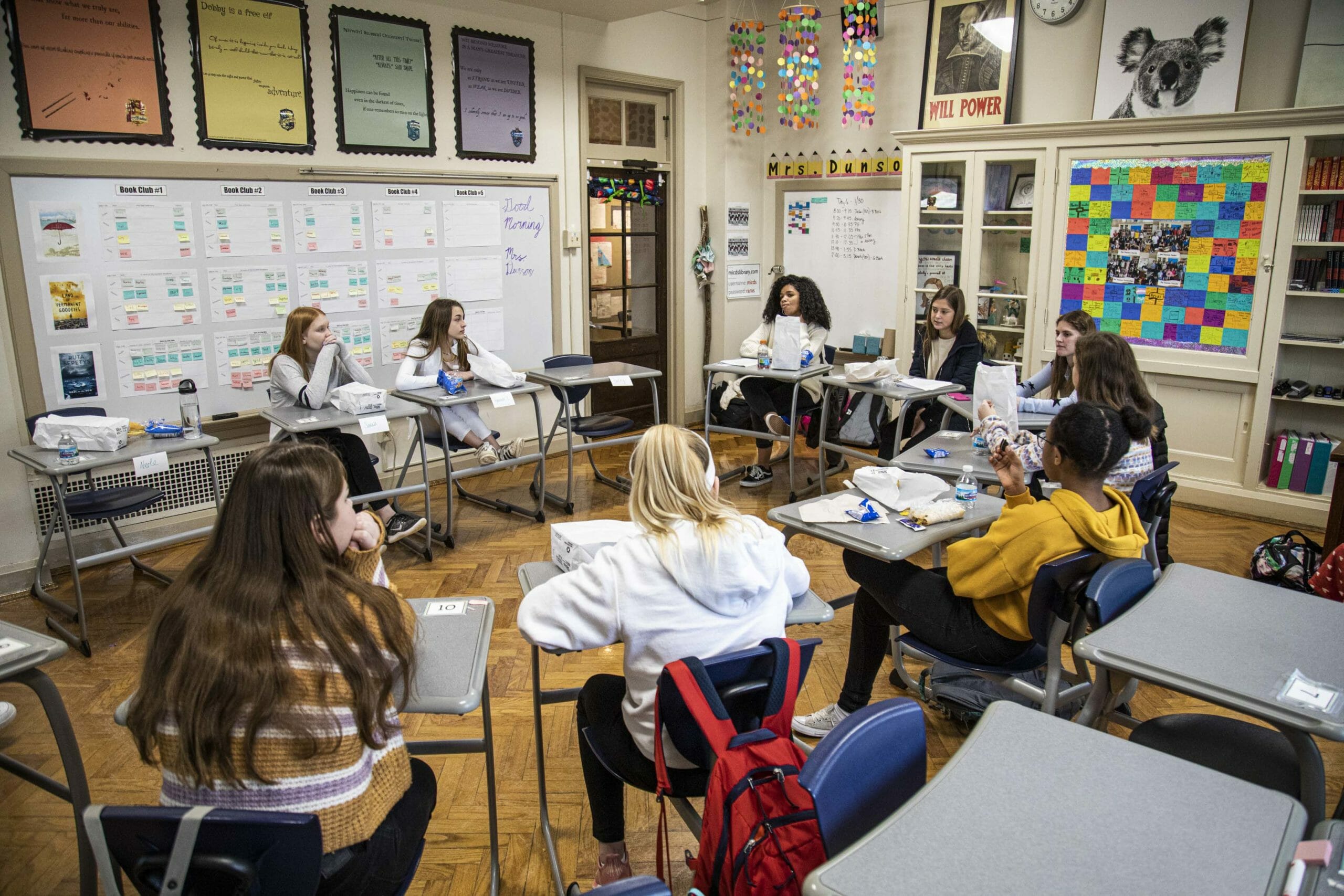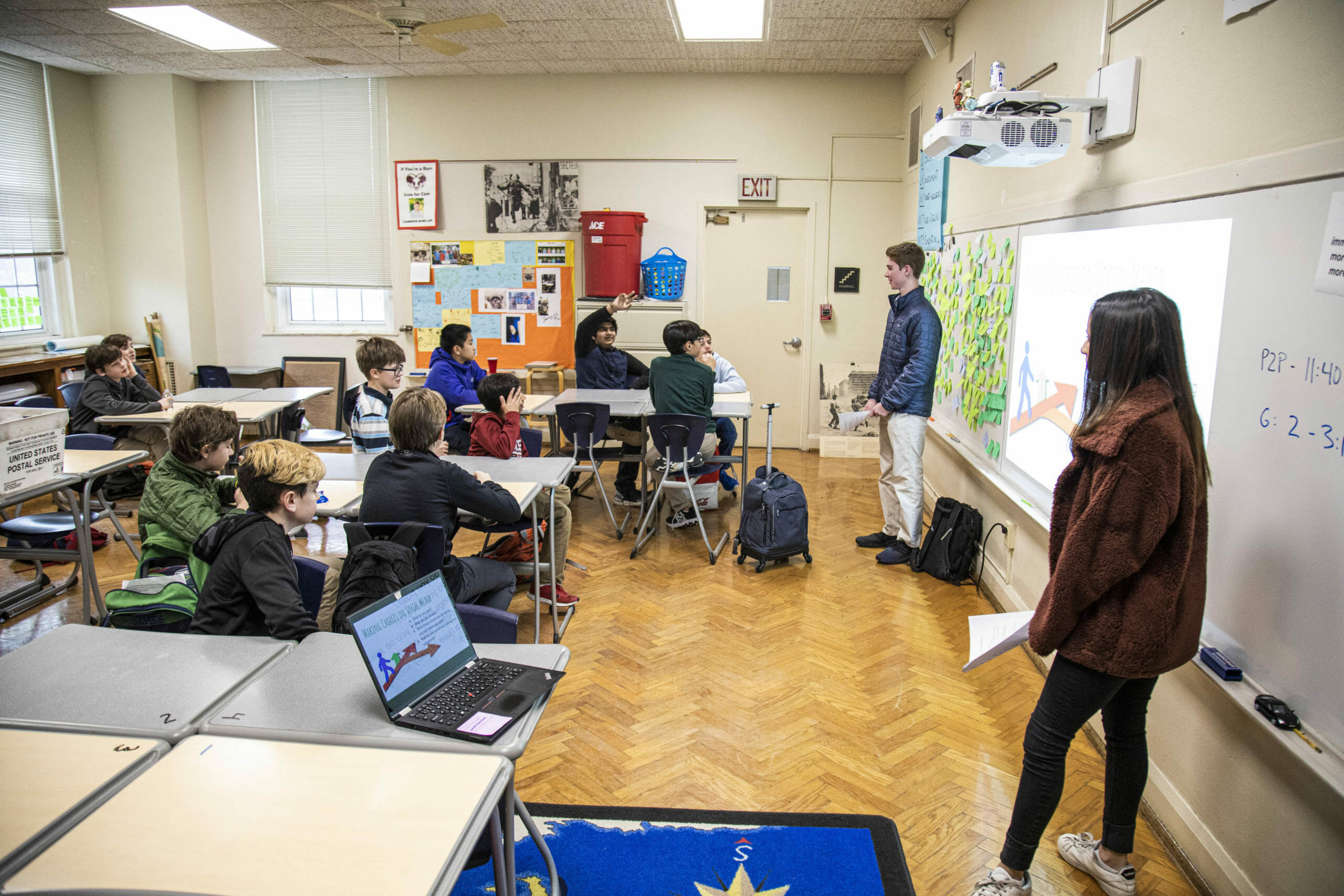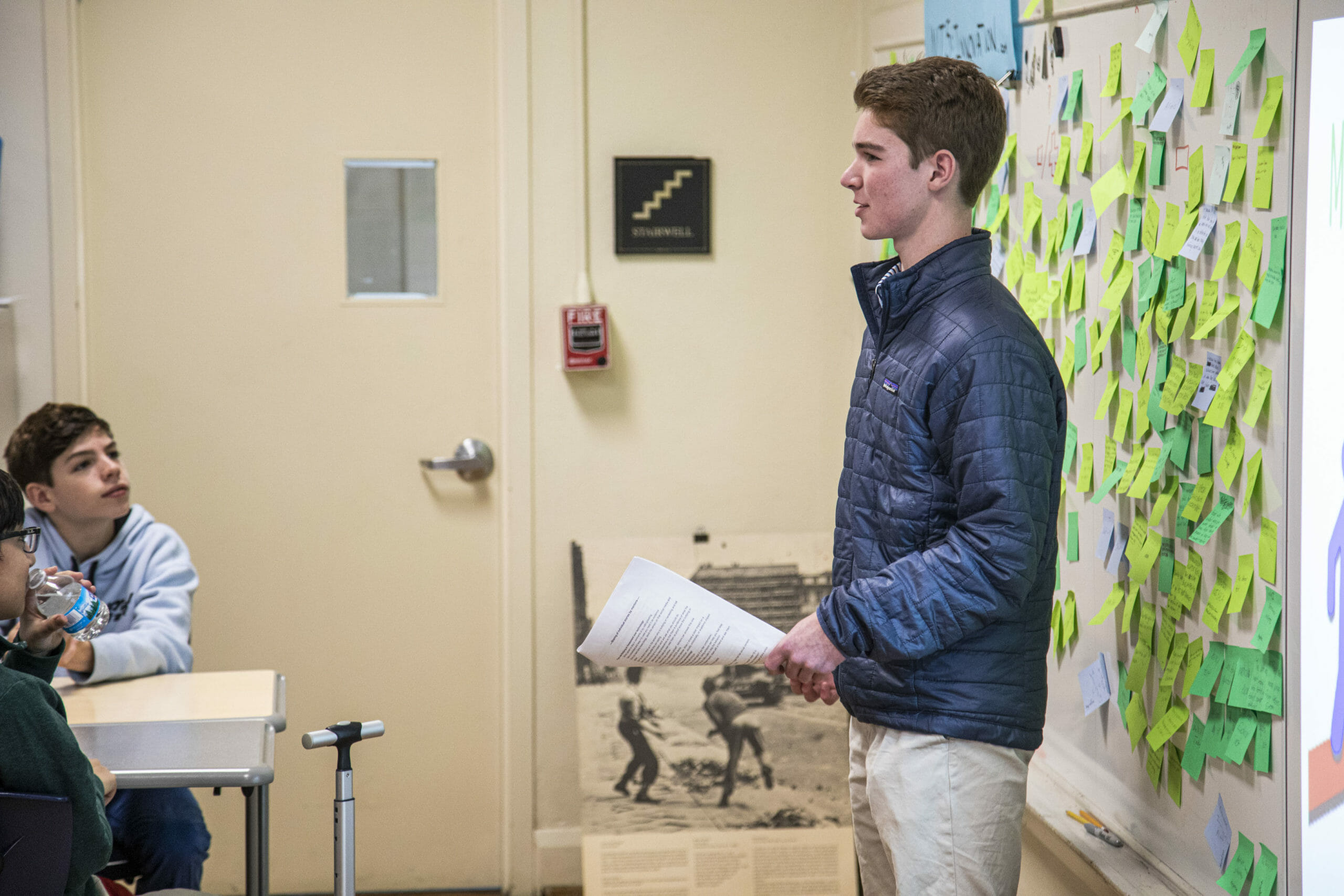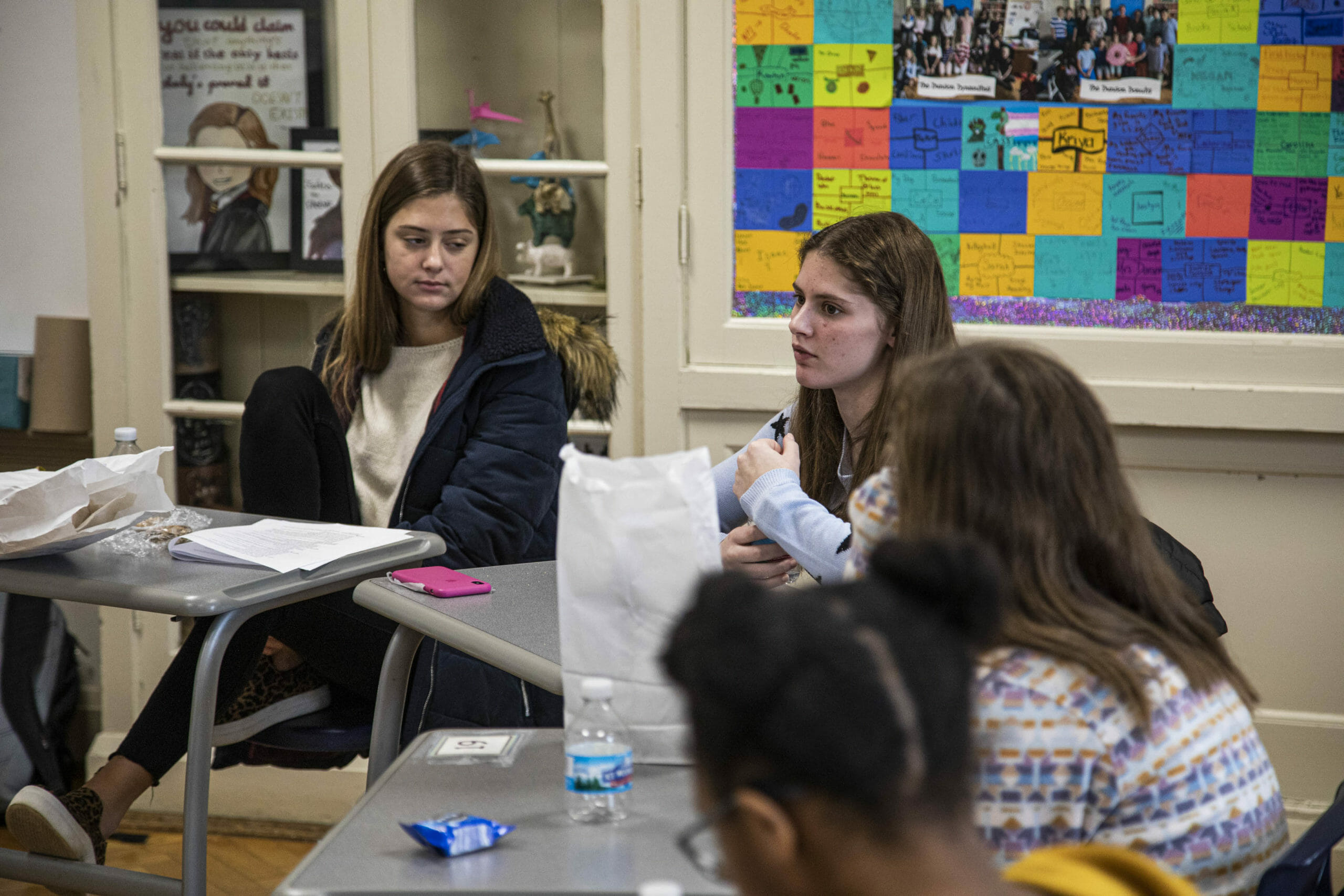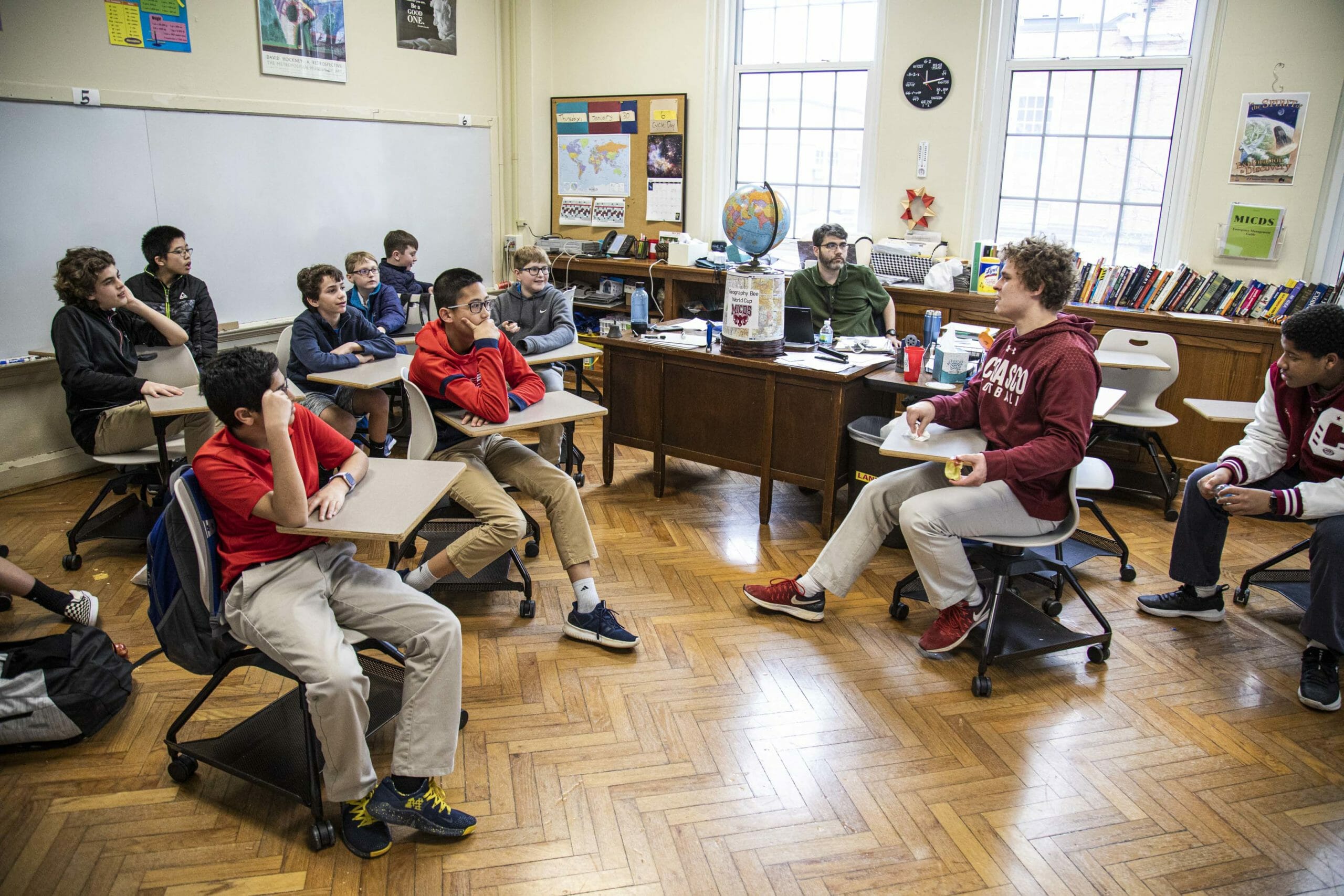TikTok. Snapchat. Instagram. The options to connect with others online are endless…and sometimes resemble a minefield where teens can stumble. As new users, Middle Schoolers can use some guidance. Who else is in a better position to talk about the perils of social media than older classmates? The mentors of the Peer to Peer program! “I like being able to talk to people who have experience with the subjects,” said Norah Wright ’25.
In 7th grade advisory last week, Upper School mentors checked in with their younger friends and tackled the important topic of technology and social media. They spent time in advisory chatting about how to use tech and social media appropriately. It’s a great subject for peer communication since today’s teens have grown up with technology and often have more real-world experience than parents.
Vicki Thurman, Director of Student Services, said, «For two years in a row, this has been one of our most popular conversations with the 7th graders. Since most of us adults have not grown up with technology as such an integral part of our lives – such as smartphones, tablets, and laptops – it is harder for us to talk to the Middle School students about how to navigate in this world. Our Upper School students have more knowledge than we do with all of this, and using their own experiences – both the good and the not so good – to guide these conversations helps the seventh graders feel understood and supported in ways we likely would not be able to!»
Managing social media responsibly is especially important for today’s students. Did you know that 36% of college admissions professionals are checking the social media accounts of prospective students? What we post today can have lasting—and sometimes negative—effects.
Kaplan Test Prep Director of College Prep Programs Sam Pritchard said, “We continue to believe that applicants’ social media content remains a wildcard in the admissions process, with what they post possibly being the tipping point of whether they or not they’re admitted to the college of their choice. Our consistent advice to teens is to remain careful and strategic about what they decide to share. In 25 years, you’ll definitely remember where you graduated college from, but you’ll unlikely remember how many people liked that photo of what you did over winter break.”
The discussion groups began with talking about the real ways teens use social media and technology and exploring both positive and negative ways that social media affects our lives on a day-to-day basis. They covered legal and ethical decision making to guide healthy choices. Older students shared situations and stories they encountered as Middle and Upper School students, and spoke about practicing positive decision making in regards to both their own technology use and what to do when their peers do not use it appropriately.
While there are many positive experiences on social media (connecting with friends, getting help with homework), there can also be negative consequences. Users may compare themselves against the “ideal” that other people post. Some students find that they get trapped into endless scrolling, wasting time away from time, family and things that matter. People may find that they’re more willing to say something from the safety of being “behind the screen” that they never would in person. It’s too easy to impulsively post something and regret it later, the older students said.
What happens if you make a mistake online? Well, things tend to “live forever” in cyberspace, creating a lasting impact on the community and students. What you thought was a private conversation really isn’t. “Joking” can go too far, and screenshots are powerful and can be shared with anyone. The mentors shared that phone calls are important, because anything sent from your phone becomes permanent, and they cautioned against getting caught up in group chats.
The mentors gave their younger classmates helpful advice on determining what to say and not say, what to post and not post. They advised that students ask themselves, “Am I okay with my grandma seeing this? Or a college representative?” They said to stop and think before saying or doing something that could hurt or embarrass someone. Try remembering what it’s like to be on the other side, how you would feel if your friends were all together and posting about it and you weren’t included. Think about how you never know what someone will forward. Keep in mind that everyone is different. Not better or worse—just different. If you feel like being mean to someone, find something else to do. Put down the phone or the computer and do something else. With photos, look at what and who is in the background, and consider whether you have someone’s permission to post. Think about why you’re posting and what your post says about you.
Each group also discussed privacy settings that help students control who sees what online and the danger of accepting unknown people in Instagram or Snapchat. They talked about location services and protecting privacy. Middle Schoolers learned how to handle bullying and harassment over technology, whether it’s directed at them or others, and how to handle mistakes. They also discussed what to do if someone posts something that causes concern about their mental health.
Anna Speller ’20 is a co-head of the Peer to Peer program. She said, «This is one of the most important lessons we do, I think. It is important for us to talk with the Middle Schoolers about all of the ins and outs of social media (like what to post and not to post, keeping account information private, and not letting people you don’t know follow you). It is so easy to make mistakes that could be very harmful and I know I did some stupid things when I was their age so we’re trying to make sure they don’t make those same mistakes. These conversations can be hard but they are very important and I think it allows us to connect with them on a more personal basis as well.»
Technology and social media, when harnessed properly, can be wonderful tools for connection and learning. Thanks to our Upper School Peer to Peer mentors, MICDS 7th graders have the skills and insight to ensure their online experience is positive.
